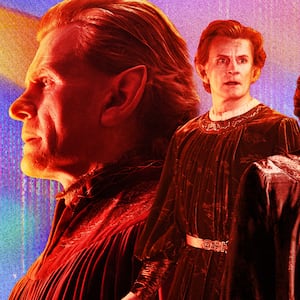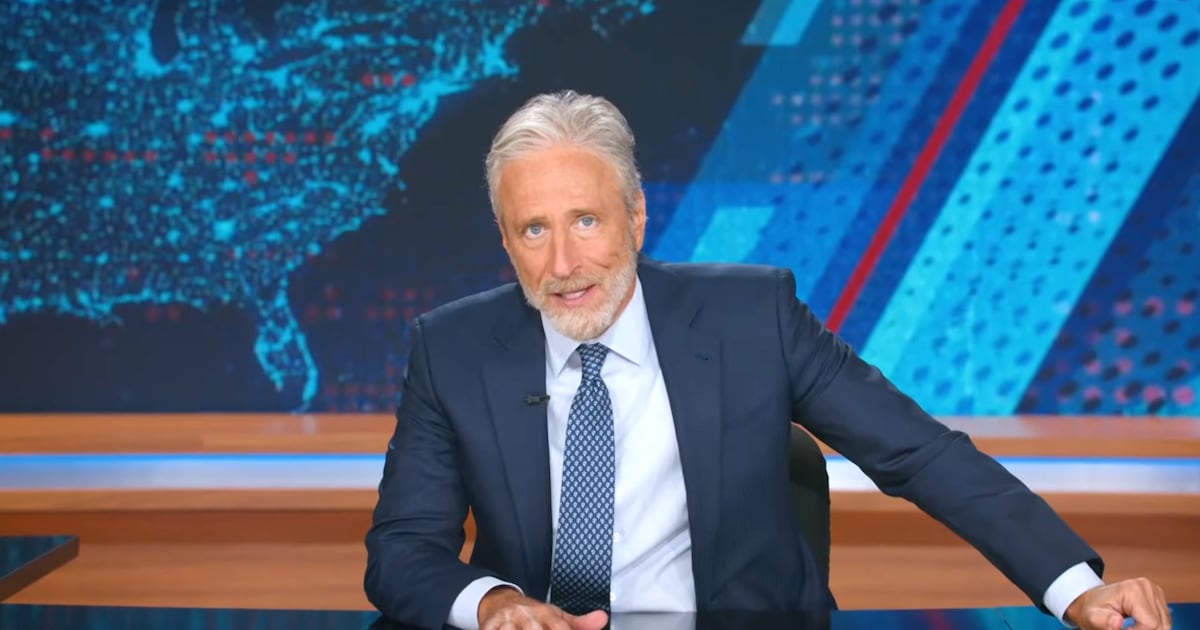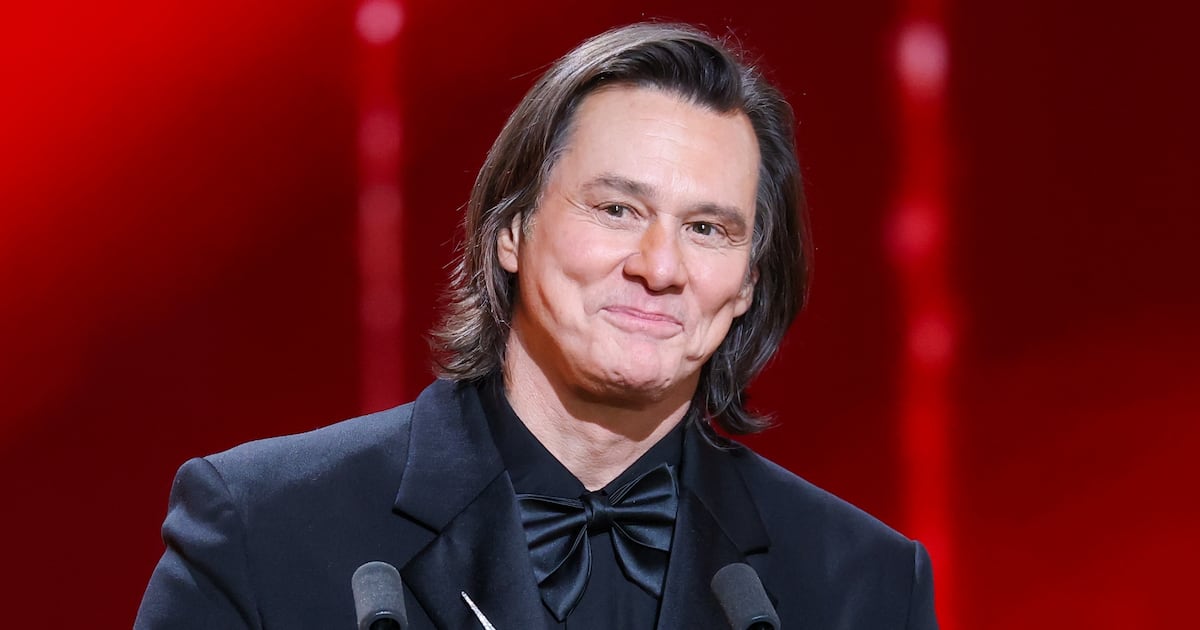The landscape of television is littered with great villains. Gustavo Fring, Joffrey Baratheon, the Cigarette Smoking Man, Vernon Schillinger—the list goes on and on. With the latest season of The Lord of the Rings: The Rings of Power now in full flow, a new power has arisen and entered that stratosphere of villainy: Charlie Vickers’ Sauron… and Halbrand… and Annatar.
Rings of Power is a staggering achievement in terms of scale and scope, with layered character development, action set-pieces that hold up against the mastery achieved by Peter Jackson 20 years ago, as well as a near-perfect balance of multiple plotlines (Númenor is still a little shaky).
But the show’s greatest achievement to date is establishing Sauron as the greatest villain currently occupying your screens. This is in part due to his characterization, in part down to the magnetic performance of Australian actor Charlie Vickers, along with the sumptuous chemistry he possesses with seemingly every character and cast member he encounters.
Starting with Vickers himself, it’s a mighty achievement that he’s established himself so fully in this show, in this role, and as a future star of the industry given his relative lack of experience prior to Rings of Power. An eight episode run in 2018’s Medici, and two minor film roles made up the entirety of his CV before taking on the mantle of the Dark Lord, but Vickers possesses the aura of someone who should occupy your screen at every possible juncture moving forward.

Charlie Vickers as Sauron
Ben Rothstein / Prime VideoTackling three characters within one is no easy feat for an experienced veteran of the small screen, let alone such a relative newcomer, but Vickers has brought a depth and a nuance to each face of Sauron we’ve been treated to thus far.
His Halbrand, an original character created for Rings of Power, was brought to life with an incredible charisma, but also a quiet vulnerability, all wrapped up in the wider mystery of Season 1’s story. The brief glimpses we’ve seen of his Sauron-esque form at the end of Season 1 never lost any of that charisma, but added a secondary layer of malice that Vickers carried with ease—an almost quiet threat that exuded off the screen.
And finally, his Annatar form, which debuted in last week’s three-episode premiere of Season 2, elevated his performance to new heights. Sauron is the greatest deceiver in all of fantasy literature, maybe all of fiction, and his Annatar form is central to that legacy. Awe-inspiringly beautiful, in essence, an emissary of the Gods themselves, Vickers brings Annatar to life with such calculated levels of grandeur—to the point that you find yourself wholly transfixed by his presence, almost as if the Valar themselves emerged before you.

Charlie Vickers
Ben Rothstein / Prime VideoWhile Vickers deserves immense credit for his stellar work in bringing new life to one of literature's greatest villains, showrunners Patrick McKay and J.D. Payne deserve their due as well for fully grasping Sauron as a character—not just as a faceless evil within a lidless eye, but as a figure who is in part a tragic one, but also a classic iteration of Machiavellian tendencies. Peter Jackson’s iconic trilogy from the early 2000s stands as one of cinema’s greatest series, but Sauron is never really delved into in any meaningful way—presented purely as the source of ultimate evil.
While McKay and Payne aren’t portraying Sauron as “good guy” by any stretch of the imagination, his characterization is one of complexity, adding a whole new meaning to our perception of him. The show hasn’t pretended Sauron wants anything other than to control all of Middle-Earth, bending the minds of its population to his will. Far from it, actually—the show has made it plain that it’s his truest desire.
But like all great villains, this desire doesn’t come out of a simple paint-by-numbers need for domination, but out of a genuine intention to, in his eyes, heal the world. As he states to Galadriel in the Season 1 finale, “Alloyed,” he sees no difference between saving and ruling Middle-Earth, but the point remains—his mission and his purpose is born out of a flawed desire to be savior.
Naturally, a villain is only as strong as the characters they work with, and Rings of Power has provided two for Sauron to manipulate, infatuate, and ultimately, control in two separate dynamics with a delicious blend of both desire and despair. Season 1 spent so much time forging the relationship between Sauron and Morfydd Clark’s wonderful Galadriel, and their relationship was the true highlight of the season. Balancing a beautiful tenderness with the unshakeable belief that something was amiss, all culminating in the extraordinary scene of Halbrand’s reveal over his true identity, and Galadriel’s culpability in his return to power.

Charles Edwards as Celebrimbor and Charlie Vickers as Sauron.
Ben Rothstein / Prime VideoSeason 2 looks to be no different, this time switching the relationship from Galadriel to Charles Edwards’ Celebrimbor—the celebrated Elven smith and forger of the titular Rings of Power. It’s in this relationship where Vickers truly brings the Machiavellian nature of his character to life, feeding on the pride and insecurity of his target to achieve his own ends. Emerging from the fire in his Annatar form, Sauron says to Celebrimbor, “When our work is complete, never again will the world overlook you as the mere scion of Fëanor, but forevermore revere you… The Lord of the Rings.” From that moment on, Celebrimbor is trapped, pulled ever further into the manipulation by his own desire to craft a legacy for himself.
Having a villain who knows exactly what strings to pull, what buttons to push, so that they ultimately achieve what they desire is paramount to any story tackling notions of good and evil, but The Rings of Power has taken it to new heights. Vickers embodies Sauron with such complexity, balancing the myriad elements of his multiple persona’s to perfection, portraying benevolence in one frame while his shadow creeps into the next.
The Rings of Power has the potential to dominate the television landscape throughout its run, particularly after such a shaky season of House of the Dragon—its main competitor in the fantasy landscape. But if The Rings of Power is to receive the adoration and accolades it deserves, so much of that will come off the back of Charlie Vickers’ portrayal as its leading antagonist.









